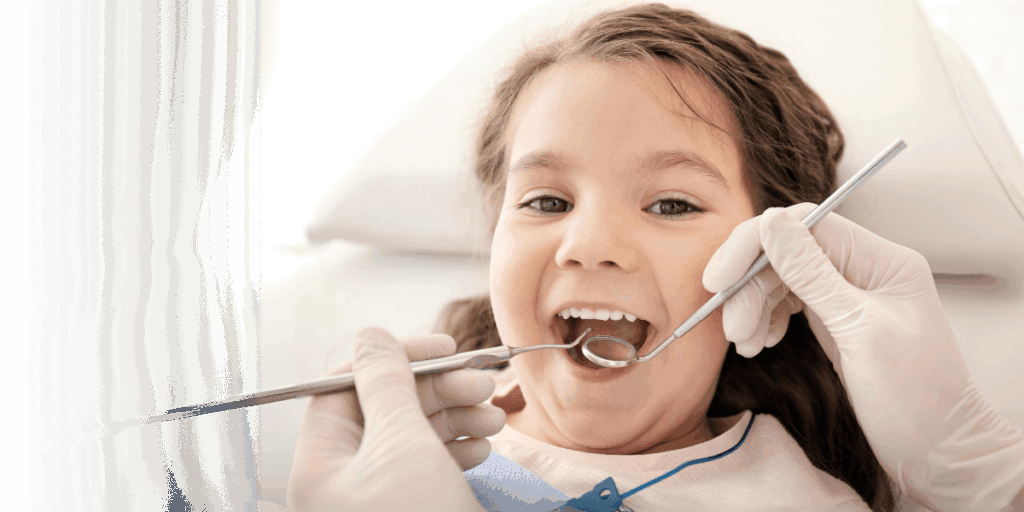Many parents are unsure when they should take their children to the dentist for the first time. Should you visit a dentist before your baby has their first tooth erupt or wait until they have a complete set of chompers? The truth is that babies should visit the dentist much earlier than you might think.
Dental disease is the most common chronic disease among children, and early prevention is your best tool in the fight against it. Visiting the dentist early and often allows a dentist to build a baseline, monitor development, and address any problems as soon as they arise. It will also help your child become comfortable with the dentist and help prevent anxiety.
When to Schedule Your Baby’s First Pediatric Dental Visit
You should schedule your baby’s first dental visit within six months of the first tooth erupting or by their first birthday, whichever comes first.
Other teeth will quickly follow once the first tooth comes in, as there are 20 baby teeth in total! People often think that baby teeth don’t matter because they’re temporary, but your baby’s first teeth set the stage for lifelong dental health.
If left uncared for, baby teeth can develop cavities, tooth decay, and gum disease. Your child might lose teeth early, leading to crowded or crooked teeth, creating other dental problems, or necessitating braces.
If you have any concerns before your visit, write them down so you can discuss them with your child’s dentist. And remember, kids are great at picking up on our emotions, so check your own anxieties at the door so you can reassure them during their appointment.
What to Expect at Your Baby’s First Dentist Appointment
Your child’s first dental visit is one of the most important, even though your child probably won’t need any maintenance at this stage. Instead, the first visit is intended to help your child get used to visiting the dentist, get baseline information, and identify any potential problems early.
First visits will vary depending on your child’s age and typically include a cleaning, fluoride treatment, and complete examination of the teeth, gums, and jaw. During the visit, your pediatric dentist will provide information on tooth decay, cavities, infant feeding practices, effective tooth and mouth cleaning practices, pacifier use, and thumb sucking.
You may also discuss fluoride treatments, which are increasingly important as a Utah bill removed fluoride from public water sources. Our Three and Under Free program offers dental cleanings for children three and under, and we’d love to get to know your toddler.
After the first visit, children should typically see a dentist every six months, just like adults. Preferably, your child should see the same dentist every time. Children feel more comfortable in familiar places, and the dentist can get a better understanding of your child’s dental development. In future visits, children will get into the regular rhythm of dental checks, x-rays, and cleanings.
Pay attention to how your child reacts during the first dental visit. How they respond to everything from the sounds and smells to the actual examination will be helpful in subsequent visits. If your child struggles with x-rays, cleanings, or any other aspects of the visit, you and the dentist can work together to reassure them, explain what is happening, and help things run smoothly.
How to Protect Your Baby’s Tiny Teeth
Your child’s baby teeth are at risk of cavities from the moment they emerge. Every time your child eats or drinks, bacteria in their mouth produce harmful acids that can create cavities, tiny holes in the protective enamel around the tooth.
Over time, these cavities can worsen, leading to infection if untreated. Keep your child’s teeth healthy from day one by adding these activities to your child’s dental routine.
Keep gums clean
Even before your baby’s first tooth erupts, clean their gums with a clean, damp cloth after feedings. Not only does this help prevent dental disease, but it can soothe the gums during teething and help your child get used to the feeling of cleaning their teeth.
Brush as soon as the first tooth erupts
As soon as you see the first tooth emerge, start brushing with a small soft-bristled toothbrush. Use a small amount of fluoride toothpaste, roughly the size of a grain of rice smeared over the bristles.
Create good brushing habits
Brush twice a day, once before bed and once earlier in the day. When your child is old enough to spit toothpaste out instead of swallowing it, upgrade them to a pea-sized amount. Brush your child’s teeth for them; it helps them learn how to brush correctly. Continue to monitor their brushing until they can do it on their own every time.
Avoid midnight snacks
Don’t offer bottles at naptime or bedtime. While it can help your baby fall asleep, eating at bedtime leaves harmful bacteria in the mouth for extended periods. It can lead to an increased risk of cavities and tooth decay. On the same token, limit snack times between meals to reduce the amount of time when bacteria are active.
Don’t forget to floss
Harmful bacteria grow in the spaces between teeth, even when there are only a few of them. As soon as your child has teeth erupting next to one another, start flossing the surfaces between them.
Conclusion
Every child is unique, and their dental journey will be unique too, but you can set them off on the right foot by establishing healthy habits and visiting a dentist early. The fight against dental disease is never over, but you don’t have to fight it alone!

No-Cost Pediatric Dental Exams for Kids Three and Under at Families First Pediatric Dentistry
One of our pediatric dentists will provide a fun and friendly exam, including an x-ray, cleaning, and fluoride treatment.




